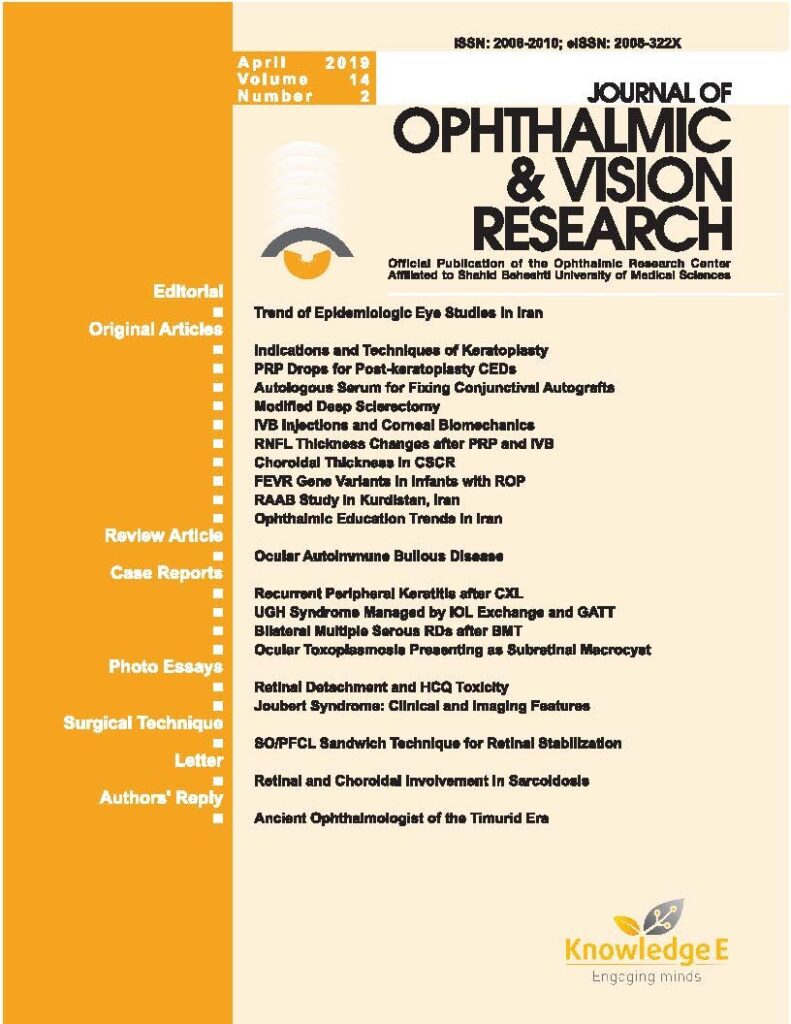
Journal of Ophthalmic and Vision Research
ISSN: 2008-322X
The latest research in clinical ophthalmology and vision science
Adenosine Receptors Expression in Human Retina and Choroid with Age-related Macular Degeneration
Published date:Feb 13 2023
Journal Title: Journal of Ophthalmic and Vision Research
Issue title: Jan–Mar 2023, Volume 18, Issue 1
Pages:51 - 59
Authors:
Abstract:
Purpose: Adenosine signaling modulates ocular inflammatory processes, and its antagonism mitigates neovascularization in both newborns and preclinical models of ocular neovascularization including age-related macular degeneration (AMD). The adenosine receptor expression patterns have not been well characterized in the human retina and choroid.
Methods: Here we examined the expression of adenosine receptor subtypes within the retina and choroid of human donor eyes with and without AMD. Antibodies specifically targeting adenosine receptor subtypes A1, A2A, A2B, and A3 were used to assess their expression patterns. Quantitative real-time PCR analysis was used to confirm gene expression of these receptors within the normal human retina and choroid.
Results: We found that all four receptor subtypes were expressed in several layers of the retina, and within the retinal pigment epithelium and choroid. The expression of A1 receptors was more prominent in the inner and outer plexiform layers, where microglia normally reside, and supported by RNA expression in the retina. A2A and A2B showed similar expression patterns with prominent expression in the vasculature and retinal pigment epithelium. No dramatic differences in expression of these receptors were observed in eyes from patients with dry or wet AMD compared to control, with the exception A3 receptors. Eyes with dry AMD lost expression of A3 in the photoreceptor outer segments compared with eyes from control or wet AMD.
Conclusion: The ocular presence of adenosine receptors is consistent with their proposed role in modulation of inflammation in both the retina and choroid, and their potential targeting for AMD treatment.
Keywords: Caffeine, Choroid, inflammation, Neovascularization, Neurodegeneration, Retina
References:
1. Klein R, Chou CF, Klein BE, Zhang X, Meuer SM, Saaddine JB. Prevalence of age-related macular degeneration in the US population. Arch Ophthalmol 2011;129:75–80.
2. Bhutto I, Lutty G. Understanding age-related macular degeneration (AMD): Relationships between the photoreceptor/retinal pigment epithelium/Bruch’s membrane/choriocapillaris complex. Mol Aspects Med 2012;33:295–317.
3. Hernandez-Zimbron LF, Zamora-Alvarado R, Ochoa-De la Paz L, Velez-Montoya R, Zenteno E, Gulias-Canizo R, et al. Age-related macular degeneration: New paradigms for treatment and management of AMD. Oxid Med Cell Longev 2018;2018:8374647.
4. Martin DF, Maguire MG, Ying GS, Grunwald JE, Fine SL, Jaffe GJ. Ranibizumab and bevacizumab for neovascular age-related macular degeneration. N Engl J Med 2011;364:1897–1908.
5. Handa JT, Bowes Rickman C, Dick AD, Gorin MB, Miller JW, Toth CA, et al. A systems biology approach towards understanding and treating non-neovascular age-related macular degeneration. Nat Commun 2019;10:3347.
6. Jabbehdari S, Handa JT. Oxidative stress as a therapeutic target for the prevention and treatment of early agerelated macular degeneration. Surv Ophthalmol 2020.
7. Jager RD, Mieler WF, Miller JW. Age-related macular degeneration. N Engl J Med 2008;358:2606–2617.
8. Hollyfield JG, Bonilha VL, Rayborn ME, Yang X, Shadrach KG, Lu L, et al. Oxidative damage-induced inflammation initiates age-related macular degeneration. Nat Med 2008;14:194–198.
9. Sakurai E, Anand A, Ambati BK, van Rooijen N, Ambati J. Macrophage depletion inhibits experimental choroidal neovascularization. Invest Ophthalmol Vis Sci 2003;44:3578–3585.
10. Nozaki M, Raisler BJ, Sakurai E, Sarma JV, Barnum SR, Lambris JD, et al. Drusen complement components C3a and C5a promote choroidal neovascularization. Proc Natl Acad Sci U S A. 2006;103:2328–2333.
11. Auchampach JA. Adenosine receptors and angiogenesis. Circ Res 2007;101:1075–1077.
12. Effendi WI, Nagano T, Kobayashi K, Nishimura Y. Focusing on adenosine receptors as a potential targeted therapy in human diseases. Cells 2020;9:785.
13. Madeira MH, Rashid K, Ambrosio AF, Santiago AR, Langmann T. Blockade of microglial adenosine A2A receptor impacts inflammatory mechanisms, reduces ARPE-19 cell dysfunction and prevents photoreceptor loss in vitro. Scientific Reports 2018;8:2272.
14. Aherne CM, Kewley EM, Eltzschig HK. The resurgence of A2B adenosine receptor signaling. Biochim Biophys Acta 2011;1808:1329–1339.
15. Merighi S, Borea PA, Stefanelli A, Bencivenni S, Castillo CA, Varani K, et al. A2a and a2b adenosine receptors affect HIF-1alpha signaling in activated primary microglial cells. Glia 2015;63:1933–1952.
16. Daly JW, Shi D, Nikodijevic O, Jacobson KA. The role of adenosine receptors in the central action of caffeine. Pharmacopsychoecologia 1994;7:201–213.
17. Maugeri G, D’Amico AG, Rasà DM, La Cognata V, Saccone S, Federico C, et al. Caffeine prevents blood retinal barrier damage in a model, in vitro, of diabetic macular edema. J Cell Biochem 2017;118:2371–2379.
18. Chen JF, Zhang S, Zhou R, Lin Z, Cai X, Lin J, et al. Adenosine receptors and caffeine in retinopathy of prematurity. Mol Aspects Med 2017;55:118–125.
19. Sorenson CM, Song Y-S, Zaitoun IS, Wang S, Hanna BA, Darjatmoko SR, et al. Caffeine inhibits choroidal neovascularization through mitigation of inflammatory and angiogenesis activities. Front Cell Dev Biol 2021;9:737426.
20. Grillo SL, McDevitt DS, Voas MG, Khan AS, Grillo MA, Stella SL, Jr. Adenosine receptor expression in the adult zebrafish retina. Purinergic Signal 2019;15:327–342.
21. Blazynski C, Perez MT. Adenosine in vertebrate retina: Localization, receptor characterization, and function. Cell Mol Neurobiol 1991;11:463–484.
22. Braas KM, Zarbin MA, Snyder SH. Endogenous adenosine and adenosine receptors localized to ganglion cells of the retina. Proc Natl Acad Sci U S A 1987;84:3906–3910.
23. Friedman Z, Hackett SF, Linden J, Campochiaro PA. Human retinal pigment epithelial cells in culture possess A2-adenosine receptors. Brain Res 1989;492:29–35.
24. Farazdaghi MK, Ebrahimi KB. Role of the choroid in age-related macular degeneration: A current review. J Ophthalmic Vis Res 2019;14:78–87.